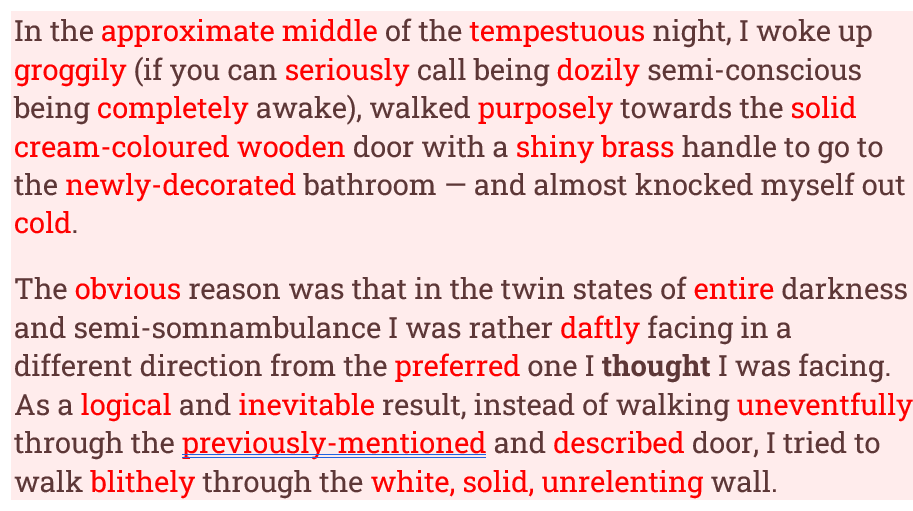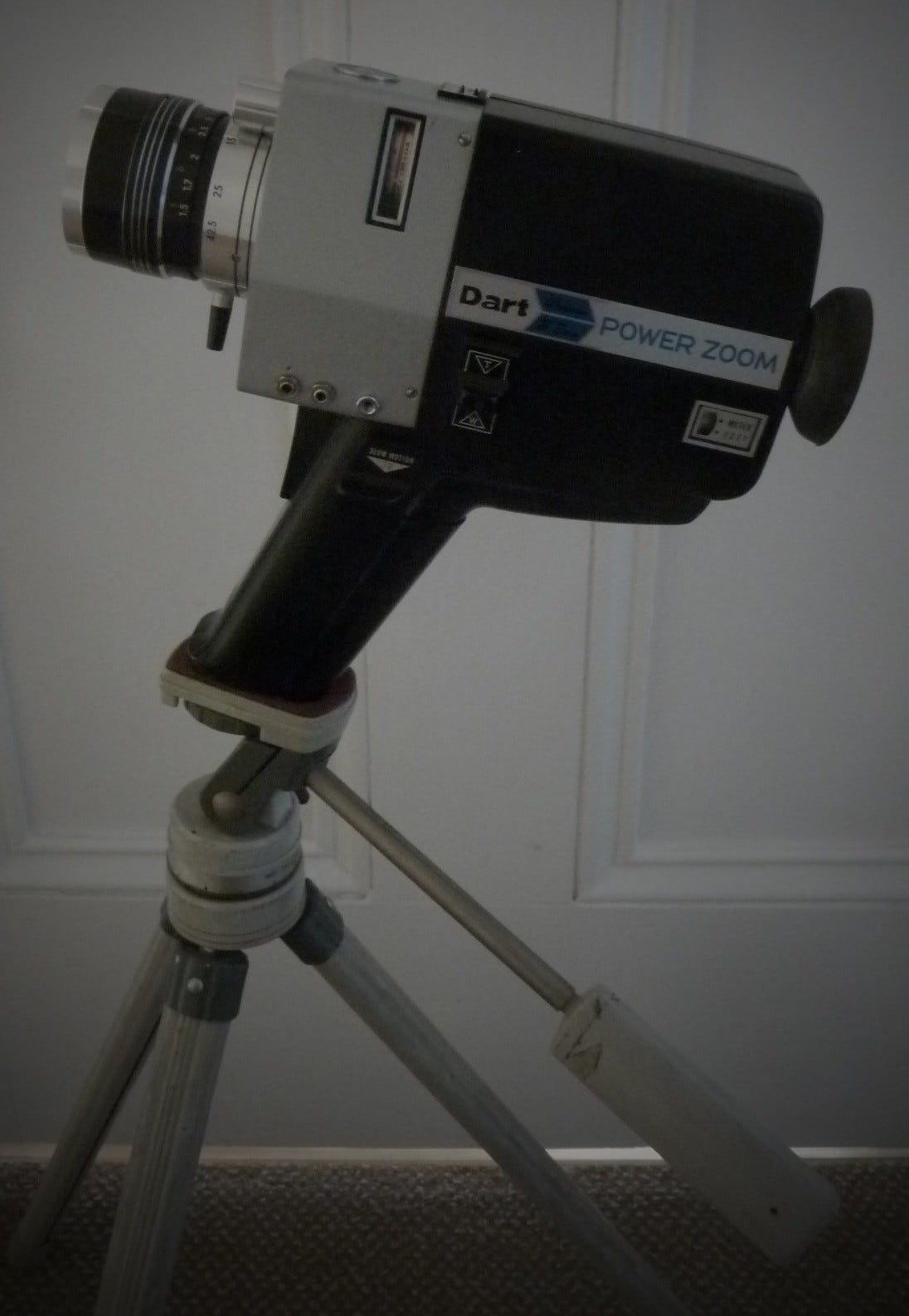The experiments in style series has been nothing if not an exercise in rule-breaking. For example, we’re told not to use adjectives or adverbs if we can avoid doing so. Why? Because the noun or the verb or the sentence as a whole should be enough to convey what you wish to convey. Basically, the stance is that using an adverb or an adjective should not be necessary, and if it is necessary than it’s a sign of weakness in the text. Something is not pulling its weight.
I’m not entirely sure I agree with this, but that’s the conventional wisdom as far as creative writing is concerned. A good way of testing this is to see what happens when you do the opposite: that is, to shoehorn in as many adverbs or adjectives as you can. Then you end up with something like this:
Well, I think you’ll agree that it’s all a bit too much. Admittedly, there were one or two adverbs and adjectives in the original which managed to slip through without causing a stir, but you could hardly miss that lot in the screenshot1.
Adverbs and adjectives are not the only culprits of course. My particular bugbear is clichéd writing, including one word sentences for, I presume, emphasis — like this:
The first four words, or rather the way they’re presented, is just lazy writing in my opinion2. Maybe the first time anyone did that it was different and made the reader sit up and take notice, but these days it’s so ubiquitous that it has surely lost its impact.
I am also of the opinion, and have been for a very long time, that if the reader notices the writing rather than what the writer is saying, then something has gone wrong. The exceptions to this rule are to be found in the works of exceptional writers. For example, Laurie Lee in Cider With Rosie describing a first kiss:
“We kissed, once only, so dry and shy, it was like two leaves colliding in air.”
Or Nabokov, in his short story Spring in Fialta, describing what might be called an anti-kiss:
“…she kissed me thrice with more mouth than meaning.”
I should also like to add Nathan Slake’s foray into the kissing territory. In his novella Brae’s Meteorite, he writes:
“It was a single kiss; long and soft and carrying with it a warmth that no other could ever bring about.”
Interestingly (I suppose), it’s a bit odd talking about breaking the rules in the context of the experiments in style series because there are rules — constraints, if you will — that are very much in play. Each version has to tell the original story, and as part of that must include all the main original elements if at all possible. What does change is the context, the colloquialisms employed and the persona I adopt, and of course breaking the usually accepted rules of the game such as not using clichés.
Purposefully abandoning the rules can yield profound insights, and I encourage you to try it in your own writing (even if you’d rather not publish the result!). You will almost certainly gain a greater appreciation of why the rules were devised in the first place.
A good example of breaking the rules was an amateur film I saw many years ago. It was shot, I believe, in 16mm film, and was a finalist in an amateur movie maker competition.
It was called A Very Boring Film, and I have to tell you that that was not a misnomer. It was easily the most boring film I have ever seen, and believe me, I’ve suffered through quite a few. After ten minutes of excruciating boredom the audience began to get restless. There was much shuffling, rustling and coughing. After 15 minutes, we all began to laugh, because we could see that we’d all been played. It was a brilliant film, and if it does still exist it’s probably gathering dust in a box in someone’s loft. Such a shame.
So what happened in the film? Nothing much. It opened with someone sitting on a table eating crisps (chips if you’re American). The telephone next to him started ringing, and kept on ringing. That’s all that happened for 14 minutes, unless you count the dynamic action of the person sitting on a window sill looking out of the window.
At around 14 minutes, the person eating crisps picked the phone up and said “It’s for you”. The window sill person walked over, took the phone, and put it back on the receiver with the words “They’ve hung up”. Then the final credits appeared.
I’ve described this to the best of my recollection. I may have some of the details wrong, but you’ve got the gist. The clever thing about the film was that it deliberately broke several rules:
There was no plot to speak of, no dynamic tension. The script must have been the easiest thing in the world to write.
There was no variation in camera angle. The whole thing was shot from one position, which was from the ground near the crisp-eater’s feet.
The only sound was diegetic, which means that the sound was in the scene itself, and would have been heard by the characters too. In other words, there was no music or sound effects that only the audience would be able to hear.
The sounds were completely boring in themselves — to the point where they were extremely irritating. Imagine the sound of crisps being crunched for nearly quarter of an hour. Imagine a phone ringing incessantly for almost the same period of time.
The film was one example of cinematic rule-breaking. I once wrote an article, lost in the decades since, about why the BBC’s Top Of The Pops (TOTP) was, at one stage, almost impossible to watch. It was because it went through a phase of seemingly using every special effect at their disposal. You’d be watching a band doing their thing and all of a sudden it would be morphed into some sort of psychedelic kaleidoscope.
Thus while the very boring form suffered from having too few effects, TOTP suffered from having too many.
I hope these observations will prove useful to you in your own writing.
I’m working on some challenges for paying subscribers, and when I’ve sorted something out I’ll let you know. In the meantime you can read the various experiments here, and paying subscibers can read about the story behind some of them here.





Very enlightening, Terry. Damn! So now do I have to go back to all my stories and start culling out my precious adjectives and adverbs? But I know so many of them! What will I do with all this unwanted vocabulary??
I fucking love adverbs!!!